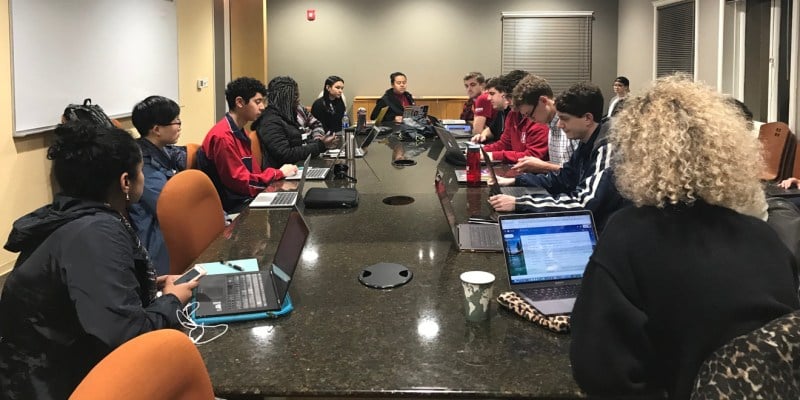At the first winter quarter meeting of the 20th Undergraduate Senate, a revote of the internal review of the Standard Grant funding process resulted in unanimous support of the internal review, conferring funding to the Dinesh D’Souza event sponsored by the Stanford College Republicans (SCR).
Additionally, the Senate voted unanimously to pass a bill that would submit a comment to the Federal Register on the recent updates to Title IX policy. Two new bills regarding increased pay and support for Ethnic Theme Associates (ETAs) and advocating for a new Disability Community Center were also introduced at the meeting.
The internal review
In an emergency meeting on Dec. 9, the Senate voted in a narrow 6-5 decision against an internal review of the Standard Grant process by ASSU financial manager LoMo Phillips ’17, which provided alternate recommendations for allocation of the Senate’s funds this quarter. The internal review was conducted in response to concerns brought forth by Phillips and ASSU President Shanta Katipamula ’19 about alleged inconsistencies in the process.
The Dec. 9 vote, however, was viewed negatively by many senators, including Appropriations Chair Gabe Rosen ’19. In Tuesday’s meeting, Deputy Chair Jianna So ’21 requested that the Senate revote on the internal review option.
“For a number of reasons, I felt that the vote was rushed with a lot of us not really knowing a lot about the internal review process and what the option was,” she said. “Since then, I know that a couple of us, including myself, have gotten to understand more fully how the internal review was conducted … I think now we can make a more informed decision.”
Phillips explained that the internal review option is $6,000 above the winter quarter budget for Standard Grants, whereas the prior option was $13,000 over budget. Senators Faa Diallo ’21 and Zakaria Sharif ’21 asked about the practical impact of a change in the funding decision on club funding.
Phillips described the process of enacting the internal review recommendation instead of the prior Senate recommendation as a three-option process depending on the group in question. If the internal review recommendation and the Dec. 9 Senate vote align, the funding won’t change. If the internal review recommended more than the Senate, funding would increase, and if less, funding would decrease.
On Tuesday, the Senate voted unanimously to pass the internal review, which includes $3,617 towards the D’Souza event, currently planned for Feb. 28.
The Senate’s initial rejection of the internal review is currently the subject of a Constitutional Council case filed on Friday by SCR, which alleges that the Senate violated the ASSU Constitution by discriminating against conservative viewpoints in its decision to deny funding to the D’Souza event.
Despite Tuesday’s revote, the Jan. 9 Constitutional Council meeting determining the frivolity of the case is scheduled to go ahead as planned.
Title IX
The Senate also voted on a bill that would submit an ASSU comment on Secretary of Education Betsy DeVos’s proposed changes to Title IX policy to the Federal Register. Though written by the ASSU, the comment speaks on behalf of the entire Stanford student body.
“We, as representatives of Stanford students, oppose the proposed changes in light of their expected harmful impacts on our community and other campuses,” the bill concludes.
Some of the comment’s recommendations include expanding DeVos’s proposed definition of sexual harassment from “so severe, pervasive and objectively offensive that it effectively denies a person equal access to the recipient’s education program or activity” to include harassment that occurs once and is not necessarily “pervasive.” The ASSU comment also advocates for expanding universities’ responsibilities when it comes to Title IX violations.
The bill was passed unanimously and accompanied by vocal support by many senators.
ETA and disability resolutions
Two new resolutions were also introduced to the Senate at the meeting. The first, written by Senators Rodolfo Salazar ’21 and Melody Yang ’21, proposes that the ASSU “recognize the valuable work that ETAs put into creating a safe and educational space for students, particularly students of color” through “support.”
The specifics of the support are not made clear in the language of the resolution, and this lack of specificity was cause for the bulk of senators’ questions.
“If it’s just saying, ‘we support this’ and saying, ‘this is something that we want to have happen,’ then I think that’s fine,” said Senator Tim Vrakas ’21. “If there’s some explicit way you want to have it supported, it should be included specifically in the bill.”
Additionally, the resolution calls for an increase in ETAs’ pay, including “financial reparations for all previous ETAs.” The reparations, which demand increased back-pay for previous ETAs, were called into question by senators.
The resolution will be voted on at the next Senate meeting.
The second resolution, written by a coalition of Senators, asks for a permanent community center as “a necessary first step in the University acknowledging disability not just as a medical category but also an identity that has broad implications for all areas of life.”
The resolution is the latest step in a 40-year-long effort for increased University support of the Disability Community.
“The meeting space for the disability community currently is not a place that they can reliably reserve,” said Student Life Committee Chair Senator Martin Altenburg ’21. “It can be overtaken by administrative bodies at Stanford when they see fit.”
ASSU Co-Director of Disability Advocacy Bryce Tuttle ’20, who is one of the students behind a 1270-signatory petition asking for a permanent disability community center, spoke to the importance of the resolution.
“I cannot say enough on how important a permanent community center would be for our community, symbolically, structurally, and I think that we’re on our way, and I’m really optimistic,” he said.
Contact Zora Ilunga-Reed at zora814 ‘at’ stanford.edu.
